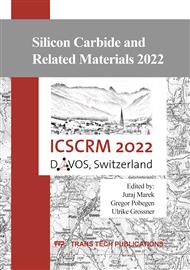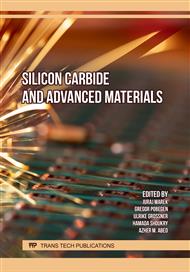[1]
European Commission, CO₂ emission performance standards for cars and vans. 2019. [Online]. Available: https://ec.europa.eu/clima/eu-action/transport-emissions/road-transport-reducing-co2-emissions-vehicles/co2-emission-performance-standards-cars-and-vans_en
DOI: 10.32625/kjei.2020.20.231
Google Scholar
[2]
S. Laferriere et al., "Power SiC: Materials, Devices and Applications 2020," Yole, Market and Technology, 2020.
Google Scholar
[3]
S. Rouchier, G. Gaudin, and J. Widiez, "150 mm SiC Engineered Substrates for High-voltage Power Devices," Trans Tech Publ., vol. 1062, p.131–135, 2021.
DOI: 10.4028/p-mxxdef
Google Scholar
[4]
E. Hugonnard-Bruyère, V. Lauer, G. Guillot, and C. Jaussaud, "Deep level defects in H+ implanted 6H–SiC epilayers and in silicon carbide on insulator structures," Mat Sci Eng B, vol. 61–62, p.382–388, 1999.
DOI: 10.1016/S0921-5107(98)00539-X
Google Scholar
[5]
G. Irmer, V. V. Toporov, B. H. Bairamov, and J. Monecke, "Determination of the Charge Carrier Concentration and Mobility in n-GaP by Raman Spectroscopy," Phys State Sol B, vol. 119, p.595–6.3, 1983.
DOI: 10.1002/pssb.2221190219
Google Scholar
[6]
L. Artús, R. Cuscó, J. Ibáñez, N. Blanco, and González-Díaz, "Raman scattering by LO phonon-plasmon coupled modes in n-type InP," Phys Rev B, vol. 60, no. 8, p.5456–5463, 1999.
DOI: 10.1103/PhysRevB.60.5456
Google Scholar
[7]
M. Usman, M. Nour, A. Yu. Azarov, and A. Hallén, "Annealing of ion implanted 4H–SiC in the temperature range of 100–800 _C analysed by ion beam techniques," Nuc Inst Methods Phys Res B, vol. 268, p.2083–2085, 2010.
DOI: 10.1016/j.nimb.2010.02.020
Google Scholar
[8]
X. Zhang et al., "Defects in hydrogen implanted SiC," Nuc Inst Methods Phys Res B, vol. 436, p.107–111, 2018.
DOI: 10.1016/j.nimb.2018.09.020
Google Scholar
[9]
M. Sharma, K. K. Soni, A. Kumar, T. Ohkubo, A. K. Kapoor, and R. Singh, "Blistering kinetics in H-implanted 4H-SiC for large-area exfoliation," Curr Appl Phys, vol. 31, p.141–150, 2021.
DOI: 10.1016/j.cap.2021.08.007
Google Scholar
[10]
N. Daghbouj et al., "The structural evolution of light-ion implanted 6H-SiC single crystal: Comparison of the effect of helium and hydrogen," Acta Mater., vol. 188, p.609–622, 2020.
DOI: 10.1016/j.actamat.2020.02.046
Google Scholar
[11]
Y. S. Katharina, S. Kumar, P. S. Lalshmy, and D. Kanjilal, "Self-organization of 6H-SiC "0001… surface under keV ion irradiation," J Appl Phys, vol. 102, p.044301, 2007.
DOI: 10.1063/1.2769804
Google Scholar
[12]
L. Zhang et al., "Raman study of amorphization in nanocrystalline 3C–SiCirradiated with C+and He+ions," J Raman Spectr, vol. 50, no. 8, p.1197–1204, 2019.
DOI: 10.1002/jrs.5631
Google Scholar
[13]
M. Chaifal and A. Jaouhari, "Raman scattering from LO phonon-plasmon coupled modes and Hall-effect in n-type silicon carbide 4H–SiC," J Appl Phys, vol. 90, p.5211, 2001.
DOI: 10.1063/1.1410884
Google Scholar
[14]
H. Harima, S. Nakashima, and T. Uemura, "Raman scattering from anisotropic LO phonon–plasmon–coupled mode in n-type 4H– and 6H–SiC," J Appl Phys, vol. 78, p.1996, 1995.
DOI: 10.1063/1.360174
Google Scholar
[15]
J. C. Burton et al., "Spatial characterization of doped SiC wafers by Raman spectroscopy," J Appl Phys, vol. 84, p.6268, 1998.
DOI: 10.1063/1.368947
Google Scholar
[16]
A. Thuaire, "Apport de l'Imagerie Raman et de la Photoluminescence à la Caractérisation de Carbure de Silicium (SiC). Application à l'Étude de Composants Électroniques," [FR], Material Sciences, conducted at Grenoble INP, Grenoble, 2006.
DOI: 10.51257/a-v1-d3119
Google Scholar
[17]
T. Kimoto, N. Inoue, and H. Matsunami, "Nitrogen Ion Implantation into a-SiC Epitaxial Layers," Phys Stat Sol A, vol. 162, p.263–276, 1997, doi: https://doi.org/10.1002/1521-396X(199707)162:1<263::AID-PSSA263>3.0.CO;2-W.
DOI: 10.1002/1521-396x(199707)162:1<263::aid-pssa263>3.0.co;2-w
Google Scholar
[18]
A. Hallén and M. Linnarsson, "Ion implantation technology for silicon carbide," Surf Coat Technol, vol. 306, no. Part A, p.190–193, 2016.
DOI: 10.1016/j.surfcoat.2016.05.075
Google Scholar
[19]
V. Simonka, A. Hössinger, J. Weinbub, and S. Selberherr, "Modeling of Electrical Activation Ratios of Phosphorus and Nitrogen Doped Silicon Carbide," in J Soc Appl Phys, Kamakura, Japan, 2017.
DOI: 10.23919/SISPAD.2017.8085280
Google Scholar
[20]
C. A. Fisher et al., "An Electrical and Physical Study of Crystal Damage in High-Dose Al- and N-Implanted 4H-SiC," Mat Sci Forum, vol. 897, p.411–414, 2017.
DOI: 10.4028/www.scientific.net/msf.897.411
Google Scholar
[21]
M. A. Capano, J. A. Cooper, and M. R. Melloch, "Ionization energies and electron mobilities in phosphorus- and nitrogen-implanted 4H-silicon carbide," J Appl Phys, vol. 87, no. 12, p.8773, 2000.
DOI: 10.1063/1.373609
Google Scholar
[22]
X. Song, "Activation des dopants implantés dans le carbure de silicium (3C-SiC et 4H-SiC)," [FR], Electronics, conducted at Université François Rabelais de Tours, Tours, 2012. [Online]. Available: https://www.applis.univ-tours.fr/theses/2012/xi.song_3815.pdf
DOI: 10.5152/iao.2022.21348
Google Scholar
[23]
E. Hugonnard-Bruyère, "Etude du comportement électrique des films minces de carbure de Silicium reportés par le procédé improve sur isolant (SiCOI)," [FR], Devices for Integrated Electronics, conducted at INSA Lyon, Lyon, 1999.
Google Scholar
[24]
D. Chaussende and N. Ohtani, "5 - Silicon Carbide," in Single Crystal of Electronic Materials, Woodhead Publishing in Electronic and Optical Materials., 2019, p.129–179. [Online]. Available: https://www.sciencedirect.com/science/article/pii/B9780081020968000057
DOI: 10.1016/b978-0-08-102096-8.00005-7
Google Scholar
[25]
C. CENBG-Université de Bordeaux, "AIFIRA : Applications Interdisciplinaires des Faisceaux d'Ions en Région Aquitaine," Scientific Comitee IN2P3, Gradignan, 2020.
Google Scholar
[26]
J. Xin, "Combining RBS/Channeling, X-ray diffraction and atomic-scale modelling to study irradiation-induced defects and microstructural changes," Physics, conducted at ED 609 / IRCER, Limoges, 2021. [Online]. Available: https://tel.archives-ouvertes.fr/tel-03219512/file/2021LIMO0017.pdf
Google Scholar



